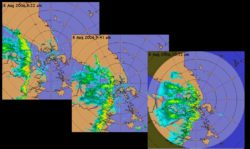Severe weather and flooding over Southeast Asia: fieldwork and modelling
- Academic lead
- Cathryn Birch (Earth and Environment)
- Industrial lead
- Stuart Webster, Met Office
- Co-supervisor(s)
- Mark Trigg (Civil Engineering), John Marsham (Earth and Environment), Ryan Neely (Earth and Environment), Paul Barrett, Met Office
- Project themes
- Environmental Flows
The Maritime Continent in Southeast Asia is a key region in the global weather and climate system for both weather and flooding. Its complex island geography and position among the warmest oceans on Earth lead to a multi-scale concoction of severe atmospheric convective and dynamical weather systems (Figure 1).


Figure 1: Typical landscape of Java, Indonesia (top) and radar imagery of a squall line over Singapore on 8 August 2006 (bottom).
The student will participate in a major international field campaign on Java, Indonesia and Christmas Island between November 2019 and February 2020 called the "Years of the Maritime Continent", which will include the BAe146 FAAM research aircraft, National Centre for Atmospheric Science (NCAS) X-band radar, plus further atmospheric and oceanographic measurements. This project is associated with the NERC large grant “TerraMaris”, which is a collaborative project between UK Universities, the Met Office and the Indonesian Weather Service (BMKG).
The observations will be used alongside atmospheric models to improve our understanding of the processes that lead to the initiation and development of major convective storms, such as those in Figure 1. The ability of weather and climate models to produce rainfall accumulations that are useful to island flood predictions will be assessed using large scale, high resolution global flood models (provided by Fathom Global (http://www.fathom.global/), and will lead to an improved understanding of the spatial patterns of flooding and their intensity. This flood modelling may provide further insights into what forecast indicators might be used to identify impacts of these specific climatic processes.
